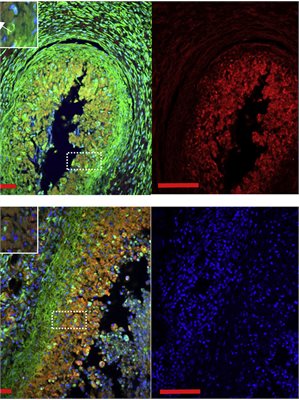
Histological analysis of tissue surrounding subcutaneously implanted silicone
Latest research on materials that resist microbial biofilm formation published
Medical devices which contact blood play an important role within healthcare. The surface materials are required to be compatible with the body and resistant to microbial colonization. In this research the Biomaterial Discovery Team describe methods for high throughput screening to look for materials with these specific properties. The materials were screened in over 15,000 individual biological assays, targeting two bacterial species, one Gram negative (Pseudomonas aeruginosa) and one Gram positive (Staphylococcus aureus) commonly associated with central venous catheter infections. Selected materials showed greater compatibility when compared to PTFE, a material that is commonly used in medical devices. They also reduced bacterial biofilm formation by more than 82% when compared with silicone. One particular material was identified as the optimal material across all the measured parameters reducing P. aeruginosa biofilm formation by up to 86% when compared with uncoated silicone.
The full article can be read in the journal Biomaterials.
Discovery of hemocompatible bacterial biofilm-resistant copolymers
Taranjit Singh, Andrew L Hook, Jeni Luckett, Manfred F Maitz, Claudia Sperling, Carsten Werner, Martyn C Davies, Derek J Irvine, Paul Williams, Morgan R Alexander.
Biomaterials, November 2020, Volume 260, 120312.
Posted on Wednesday 11th November 2020